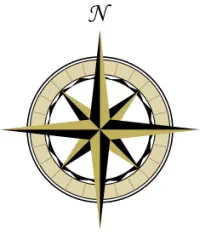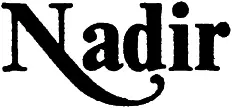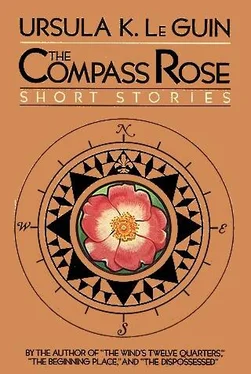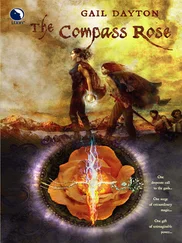Preface

By calling this book The Compass Rose I hoped to suggest that some pattern or coherence may be perceived in it, while indicating that the stories it contains tend to go off each in its own direction. They take place all over the map, including the margins. It is not even clear to me what the map is a map of. A mind, no doubt; presumably the author’s. But I expect there is more to it than that. One’s mind is never simply one’s own, even at birth, and ever less so as one lives, learns, loses, etc.
The four directions, NESW, of the Rose of the Winds, our magnetic compass, converge into or arise out of an unspoken fifth direction, the center, the corolla of the rose.
Many of the American peoples who were dispossessed by the compass-guided invaders from the East structured their world upon the four wind directions (or half-directions) and two more, Above and Below, also radial to the center/self/here and now, which may sacramentally contain the other six, and thus the Universe. This is the compass in four dimensions, spatial and temporal, material and spiritual, the Rose of the New World.
As a guide to sailors this book is not to be trusted. Perhaps it is too sensitive to local magnetic fields.
Within it, various circling motions may be perceived,as between the first and last stories, and the fourth and seventeenth. It gives rise to apparent excursions outward which are in fact incursions inward, such as the eleventh story; while the only piece describing a place whose objective reality may be confirmed on a present-day map of present-day Earth, the seventh, is perhaps the most subjective one of the lot.
As for the reasons why a particular story is assigned to a particular direction, they are not very serious. Nadir may be down underground, for instance, or in the depths, or simply downhearted. The organising principle may be historical, or poetical, or literal. Surely one of the means of learning to know the world as alive with symbol and meaning is to cultivate the art of taking things literally?
The title of an earlier collection of my stories was The Wind’s Twelve Quarters, a compass borrowed from A. E. Housman. To this one, let me set as motto a French poem of Rainer Maria Rilke, from the group Les Roses.
Est-ce en exemple que tu te proposes?
Peut-on se remplir comme les roses,
en multipliant sa subtile matière
qu’on avait fait pour ne rien faire?
Car ce n’est pas travailler que d’être
une rose, dirait-on.
Dieu, en regardant par la fenêtre,
fait la maison.
In English, Rilke asks the rose something like this:
Is it as a model you propose
yourself? Can one be filled up like a rose
by multiplying one’s subtle stuff?
Is make-work enough?
For really, you can’t call it work,
to be a rose.
God, while looking out the window,
keeps the house.
—Ursula K. Le Guin
Nadir

The Author of the Acacia Seeds

And Other Extracts from the Journal of the Association of Therolinguistics
The messages were found written in touch-gland exudation on degerminated acacia seeds laid in rows at the end of a narrow, erratic tunnel leading off from one of the deeper levels of the colony. It was the orderly arrangement of the seeds that first drew the investigator’s attention.
The messages are fragmentary, and the translation approximate and highly interpretative; but the text seems worthy of interest if only for its striking lack of resemblance to any other Ant texts known to us.
Seeds 1—13
[I will] not touch feelers. [I will] not stroke. [I will] spend on dry seeds [my] soul’s sweetness. It may be found when [I am] dead. Touch this dry wood! [I] call! [I am] here!
Alternatively, this passage may be read;
[Do] not touch feelers. [Do] not stroke. Spend on dry seeds [your] soul’s sweetness. [Others] may find it when [you are] dead. Touch this dry wood! Call: [I am] here!
No known dialect of Ant employs any verbal person except the third person singular and plural and the first person plural. In this text, only the root forms of the verbs are used; so there is no way to decide whether the passage was intended to be an autobiography or a manifesto.
Seeds 14-22
Long are the tunnels. Longer is the untunneled. No tunnel reaches the end of the untunneled. The untunneled goes on farther than we can go in ten days _[i.e., forever]. Praise!
The mark translated “Praise!” is half of the customary salutation “Praise the Queen!” or “Long live the Queen!” or “Huzza for the Queen!”—but the word/mark signifying “Queen” has been omitted.
Seeds 23—29
As the ant among foreign-enemy ants is killed, so the ant without ants dies, but being without ants is as sweet as honeydew.
An ant intruding in a colony not its own is usually killed. Isolated from other ants, it invariably dies within a day or so. The difficulty in this passage is the word/mark “without ants,” which we take to mean “alone”—a concept for which no word/mark exists in Ant.
Seeds 30—31
Eat the eggs! Up with the Queen!
There has already been considerable dispute over the interpretation of the phrase on Seed 31. It is an important question, since all the preceding seeds can be fully understood only in the light cast by this ultimate exhortation. Dr. Rosbone ingeniously argues that the author, a wingless neuter-female worker, yearns hopelessly to be a winged male, and to found a new colony, flying upward in the nuptial flight with a new Queen. Though the text certainly permits such a reading, our conviction is that nothing in the text supports it—least of all the text of the immediately preceding seed, No. 30: “Eat the eggs!” This reading, though shocking, is beyond disputation.
We venture to suggest that the confusion over Seed 31 may result from an ethnocentric interpretation of the word “up.” To us, “up” is a “good” direction. Not so, or not necessarily so, to an ant. “Up” is where the food comes from, to be sure; but “down” is where security, peace, and home are to be found. “Up” is the scorching sun; the freezing night; no shelter in the beloved tunnels; exile; death. Therefore we suggest that this strange author, in the solitude of her lonely tunnel, sought with what means she had to express the ultimate blasphemy conceivable to an ant, and that the correct reading of Seeds 30-31, in human terms, is:
Eat the eggs! Down with the Queen!
The desiccated body of a small worker was found beside Seed 31 when the manuscript was discovered. The head had been severed from the thorax, probably by the jaws of a soldier of the colony. The seeds, carefully arranged in a pattern resembling a musical stave, had not been disturbed. (Ants of the soldier caste are illiterate; thus the soldier was presumably not interested in the collection of useless seeds from which the edible germs had been removed.) No living ants were left in the colony, which was destroyed in a war with a neighboring anthill at some time subsequent to the death of the Author of the Acacia Seeds.
Читать дальше






